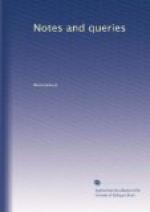C. Ross.
Strangers in the House of Commons.—As a rider to the notice of CH. in “NOTES AND QUERIES,” it may be well to quote for correction the following remarks in a clever article in the last Edinburgh Review, on Mr. Lewis’ Authority in Matters of Opinion. The Reviewer says (p. 547.):—
“This practice (viz., of publishing the debates in the House of Commons) which, &c., is not merely unprotected by law—it is positively illegal. Even the presence of auditors is a violation of the standing orders of the House.”
ED. S. JACKSON.
* * * * *
FOLK LORE.
High Spirits considered a Presage of impending Calamity or Death:—
1. “How oft when men are at
the point of death
Have they been merry! which their keepers
call
A lightning before death.”
Romeo and Juliet, Act v. Sc. 3.
2. “C’etait le jour de Noel [1759]. Je m’etais leve d’assez bonne heure, et avec une humeur plus gaie que de coutume. Dans les idees de vieille femme, cela presage toujours quelque chose do triste.... Pour cette fois pourtunt le hasard justifia la croyance.”—Memoires de J. Casanova, vol. iii p. 29.
3. “Upon Saturday last ... the Duke did rise up, in a well-disposed humour, out of his bed, and cut a caper or two.... Lieutenant Felton made a thrust with a common tenpenny knife, over Fryer’s arm at the Duke, which lighted so fatally, that he slit his heart in two, leaving the knife sticking in the body.”—Death of Duke of Buckingham; Howell. Fam. Letters, Aug. 5, 1628.
4. “On this fatal evening [Feb. 20, 1435], the revels of the court were kept up to a late hour ... the prince himself appears to have been in unusually gay and cheerful spirits. He even jested, if we may believe the cotemporary manuscript, about a prophecy which had declared that a king should that year be slain.”—Death of King James I.; Tytler, Hist. Scotland, vol. iii. p. 306.
5. “‘I think,’ said the old gardener to one of the maids, ’the gauger’s fie;’ by which word the common people express those violent spirits which they think a presage of death.”—Guy Mannering, chap. 9.
6. “H.W.L.” said: “I believe the bodies of the four persons seen by the jury, were those of G.B., W.B., J.B., and T.B. On Friday night they were all very merry, and Mrs. B. said she feared something would happen before they went to bed, because they were so happy.”—Evidence given at inquest on bodies of four persons killed by explosion of firework-manufactory in Bermondsey, Friday, Oct. 12, 1849. See Times, Oct. 17, 1849.
Nos. 1, 2, 5, 6, are evidently notices of the Belief; Nos. 3, 4, are “what you will.” Many of your correspondents may be able to supply earlier and more curious illustrations.




